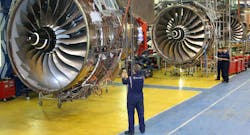Rolls-Royce 787 Engine Woes Widen as Fault Found in Variant
Rolls-Royce Holdings Plc’s engine-durability crisis worsened as the company revealed it has detected new issues that will require extra repair shop visits on a further batch of turbines that power Boeing Co.’s 787 airliner.
The glitch concerns the intermediate pressure compressor on a “small number” of Package B Trent 1000 engines for the Boeing plane, London-based Rolls-Royce said in a statement Monday. The shares fell as much as 2.2%.
Following an agreement with the U.S. manufacturer and regulators, some 166 engines that are potentially affected will undergo a one-time inspection to assess the extent of the problem, Rolls said. Package B turbines have been in service since 2012, and evidence of wear has been detected on “high life” examples, it added.
While the check-up visits will incur “some additional cost,” Rolls-Royce stood by its 2018 free cash-flow estimate of 450 million pounds (US$604 million), plus or minus 100 million pounds. The reiteration takes into account increased servicing of Package C engines, where the glitch was originally detected, as well as mitigating actions being taken across the group, the company said.
Failed Inspections
About 80% of the Package C engine version have undergone initial checks for cracking or signs of wear and tear on turbine blades, a person with knowledge of the issue has said. Just under a third of those engines failed the initial inspections required by regulators for planes that fly more than 2 hours and 20 minutes from the nearest diversionary airport.
Chief Executive Officer Warren East has said Rolls-Royce will reduce discretionary spending to offset the additional funds needed for overhauls and to keep to a key target of reaching 1 billion pounds in free cash flow by 2020.
The engine maker is due to unveil a new restructuring plan authored by turnaround consultant Alvarez & Marsal at a capital markets day June 15.
The engine maker is set to slash 4,000 jobs as part of the plan in a bid to cut costs and increase profits, the Sunday Times reported, without saying where it got the information. The cull could concern middle management and back-office staff.
“We are proposing to move to a considerably simplified staff structure, with fewer layers and greater spans of control across the group,” a spokesperson said in response to the report, declining to give details on any impact on jobs.
The shares fell 0.9% to 827.60 pence at 8:20 a.m. in London, giving a market value of 15.4 billion euros.
By Christopher Jasper
About the Author
Bloomberg
Licensed content from Bloomberg, copyright 2016.
